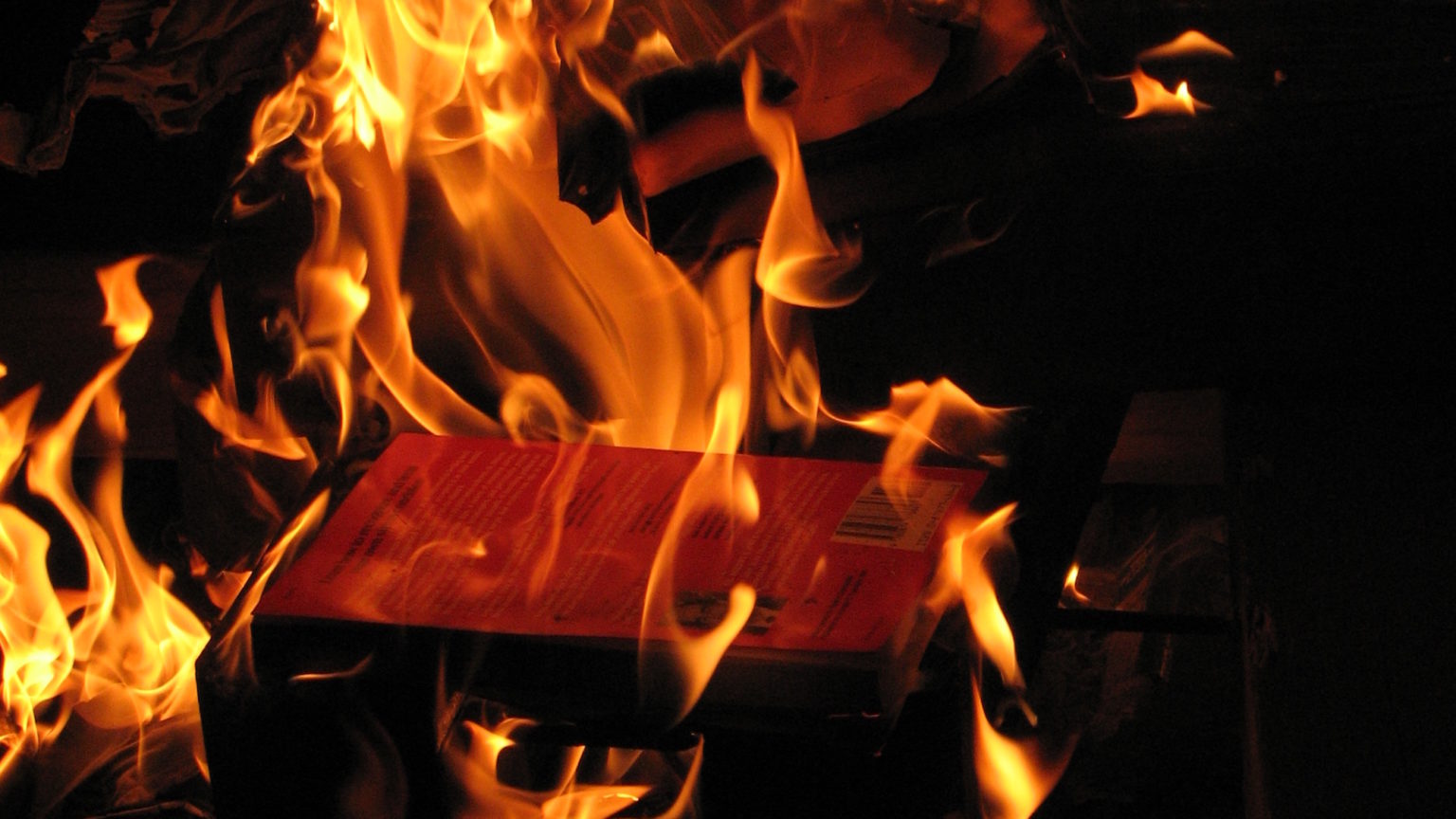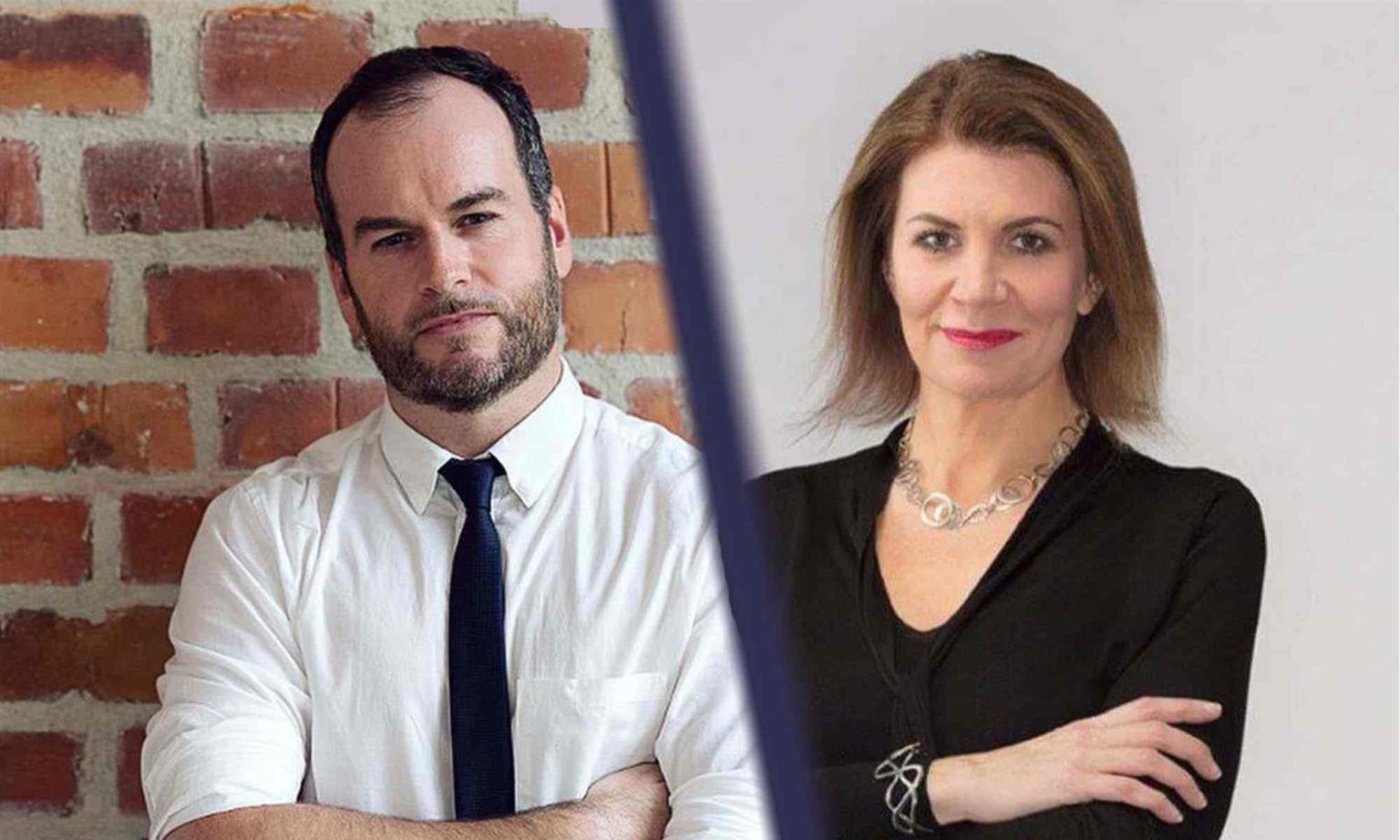Woke book-burning
A Canadian school board burned 30 ‘problematic’ books. Are you scared yet?

Want to read spiked ad-free? Become a spiked supporter.
There’s a new phrase in the woke lexicon, and it might just be the most chilling one yet. Flame purification. You don’t need a PhD in linguistics to guess what this means, to figure out what kind of act is being referred to with this positively medieval phrase. It’s book-burning. Woke book-burning. Yes, the self-selected guardians of correct thought, the neo-priestly elites of political correctness, are now purging problematic literature with fire, purifying public life with the flames of their woke fury. They’re not even hiding it anymore. They’re proud of it. ‘We’re off to do some flame purification’, they’re essentially saying.
This creepy term that should send a shiver down the spine of anyone who favours liberty and reason emerged from a school board in Ontario, Canada. Conseil scolaire catholique Providence, a francophone school board, carried out the book-burning in 2019. They called it a flame-purification ceremony, according to the National Post. Radio Canada was the first to report on this fiery shindig. It says 30 problematic books were burned for ‘educational purposes’ and the ashes were used as fertiliser to plant a tree. ‘We bury the ashes of racism, discrimination and stereotypes in the hope that we will grow up in an inclusive country where all can live in prosperity and security’, said the narrator in a video about the book-burning made for students.
This deranged ceremony captures so much that is wrong with the new intolerance and, in particular, with the neo-Maoist war on allegedly bad books, bad ideas and bad history. There’s the slippery euphemisms. To describe a book-burning as ‘educational’ requires industrial levels of brass neck. As if the destruction of literature, the fiery erasure of words and ideas, could ever serve an ‘educational purpose’. As if this isn’t in fact the antithesis of learning – a brazen abdication of the responsibility to preserve and engage with the ideas of history. Then there’s the transformation of the sacrificial book ashes into fertiliser, to feed Mother Nature, which seems designed to give this deeply anti-human ceremony the appearance of being a positive, eco-friendly, fun, hippyish act.
The flame-purification ceremony was talked up as an act of ‘reconciliation’ with Canada’s Indigenous peoples. A total of 4,700 books were removed from the shelves of francophone schools in Ontario in what can only be described as a state-wide Inquisitorial purge. The books included Tintin in America (for depicting Indigenous people in a negative light), books that contained ‘cultural appropriation’, and biographies of French explorers who discovered parts of what is now known as Canada. The flame-purification ceremony was, according to the school board, about making a ‘gesture of openness and reconciliation by replacing books in our libraries that had outdated content… about First Nations, Métis and Inuit people’.
Have words lost all their meaning? Have both French and English come to be so degraded that actual educators can describe the destruction of works of literature as an act of ‘openness’? This is pure Newspeak, the cynical reimagination of the low, dark act of burning a book as a wonderful gesture of open-mindedness; the presentation of the violent exclusion of certain works of literature as an act of ‘inclusion’. There’s a racist component, too. The idea that removing thousands of books from the shelves of schools largely attended by white kids, and ‘purifying’ some of those books with fire, is what Indigenous people need and possibly want is offensive. It treats First Nations people as being entirely outside of the realm of modernity, of education, whose anger can only be placated with the sacrifice of the white man’s evil (or ‘problematic’, as we say these days) literature.
Flame purification is a new low in the politics of wokeness. It confirms just how intolerant the new elites have become. We should always resist the juvenile, 21st-century trend of comparing everything to fascism, but sometimes that can be hard. In this instance it is difficult not to recall Nazi book-burnings, though at least the Nazis had the honesty to admit that they were exercising intolerance, that they were purging the Earth of decadent and dangerous ideas. Woke book-burning comes dressed in the dishonest language of openness and inclusion. It’s about education and tree-planting, apparently, not using fire to punish wrongthink and to inform onlookers, in this case schoolkids, that there is only one right way to think about the world.
Ontario’s woke book-burning has caused a great deal of concern. Canadian PM Justin Trudeau has condemned it. ‘I would never agree to the burning of books’, he says. And yet for all the handwringing over this unquestionably horrific event, the truth is that woke book-burning happens all the time these days. Sure, they might not always use fire, but as Ray Bradbury once said, ‘There is more than one way to burn a book’. That Ontario school board prefers to use fire, others prefer to use pressure or threats of boycotts to try to ensure that certain books are purged from the world.
Consider the fury still swirling around Abigail Shrier’s book, Irreversible Damage: The Transgender Craze Seducing Our Daughters. Trans campaigners managed to get that book temporarily taken off Amazon and out of Target. ‘Burn this book?’, as one critical account drily said of the viciously intolerant agitation against Shrier’s book. Or consider the new fashion for staff at book publishers to protest when their employers publish something they disapprove of – like Jordan Peterson’s latest book, for example. Or think about the decolonisation campaigns on campuses across the Anglosphere, which, like that flame-purification ceremony, are often concerned with removing ‘problematic’ books – ie, books by dead white European males – from the curriculum. Then there’s statue-smashing, demands that museums hide or return certain artefacts, protests for the changing of street names or building names. All of these are forms of ‘purification’, though executed by protests and tears rather than with fire.
‘Purification’ is the perfect word for all this. To purify, to remove contaminants, to cleanse. In the religious sense, of course, purification means to remove the human contaminant, the person who has erred or sinned. This is the stage wokeness has now reached: the purification stage; the removal, whether by fire or by threats or by other means of unpersoning, any book or idea or heretical individual that falls short of the demands of woke dogma. I prefer the Enlightenment approach, and the view of John Locke in particular, in his letter on tolerance. No one, he said, should be compelled ‘by fire or sword’ to believe particular things. Put out the fires, stand up to the cancellers – society must not be purified of freedom of speech.
Brendan O’Neill is editor of spiked and host of the spiked podcast, The Brendan O’Neill Show. Subscribe to the podcast here. And find Brendan on Instagram: @burntoakboy

A world gone mad – with Brendan O'Neill and Julia Hartley-Brewer
Wednesday 22 September – 7pm to 8pm
Tickets are £5, but spiked supporters get in for free.
Picture by: Patrick Correa, published under a creative-commons licence.
Who funds spiked? You do
We are funded by you. And in this era of cancel culture and advertiser boycotts, we rely on your donations more than ever. Seventy per cent of our revenue comes from our readers’ donations – the vast majority giving just £5 per month. If you make a regular donation – of £5 a month or £50 a year – you can become a and enjoy:
–Ad-free reading
–Exclusive events
–Access to our comments section
It’s the best way to keep spiked going – and growing. Thank you!









Comments
Want to join the conversation?
Only spiked supporters and patrons, who donate regularly to us, can comment on our articles.